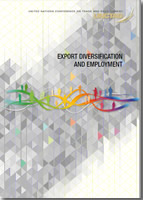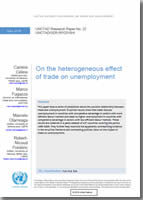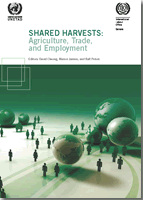Enabling the potential of trade to generate and improve employment in developing countries and countries with economies in transition.
Trade and employment are related to development in many ways:
-
Trade creates jobs. Exports can increase income for example by expanding demand, achieving higher returns, and bringing production closer to full capacity, thus affecting employment levels. Imports can increase inflows of knowledge and other inputs, with a potential to improve the labour market.
-
Trade improves jobs, impacting on the skill level of workers, improving productivity through economies of scale, diversified client base and knowledge transfer, which can be linked to positive wage premiums and skills upgrading.
-
The services economy and trade as a key contributor for employment. In addition to being the most relevant source of employment, services are increasingly important for the creation of jobs related to GVCs.
We support countries to use trade to create and improve employment through our analytical, technical cooperation, and consensus building work.
Our objectives:
-
Enhancing understanding on the linkages between trade, job creation, and improvement of conditions in the labour market
-
Supporting trade negotiations in their role of enabling the generation and improvement of employment
-
Identifying coherent policy approaches to enable the potential of trade to generate jobs and support better conditions in the labour market
Our focus areas include:
-
Trade, global value chains and employment
-
Employment and the trading system
-
Services economy and trade and employment
- Synergies of UNCTAD's Work
-
Each of the focus areas of our work on trade and employment builds on synergies with broader UNCTAD work.
Trade, global value chains and employment:
The employment generation and improvement dimensions of trade are a cross-cutting concern of UNCTAD's broad work on trade policy.
Trade Policy Framework Reviews include the analysis of how trade and trade policy can contribute to sustainable development and employment in particular. Trade policy meetings often contribute to discussions on trade employment, including by the organization of dedicate panels.
Employment and the trading system:
UNCTAD is represented in the meetings of the WTO bodies, and follows-up on their proposals and deliberations.
The linkages between trade and employment are also supported by UNCTAD's broad work on trade negotiations and also in the Doha Development Agenda and on preferential treatment. This area also benefits from work on regional integration processes, including contributing to discussions and negotiations on the African CFTA.
Some outputs include the global study on "The impact of trade and trade agreements on employment in developing countries" and country case-studies on Ecuador, Senegal and South-Africa.
Services economy and trade and employment:
The UNCTAD's Multi-year Expert Meeting on Trade, Services and Development includes recurrent contributions to the debate on services, trade and employment, and on how services and regulatory frameworks are required to harvest the potential of trade to generate and improve employment.
UNCTAD's Services Policy Reviews (SPRs) also support the analysis on how the services economy and trade can contribute to employment, by providing a thorough and customized analysis of several services activities in a country. The focus on SPRs on infrastructure services as enablers of trade and competitiveness in all economic sectors is especially important for expanded effects on employment.
- Partnerships
-
International Labour Organization (ILO)
UNCTAD has a longstanding collaboration with the ILO on trade and employment, including joint publications and meetings. The ILO regularly participates on UNCTAD's Multi-year Expert Meeting on Trade, Services and Development and trade policy meetings.
International Collaborative Initiative on Trade and Employment (ICITE)
UNCTAD participates in this initiative that seeks a better understanding of how trade interacts with employment, promote discussion on these issues and develop policy-relevant conclusions.
This joint undertaking comprises 10 international organizations: the African Development Bank (AfDB); Asian Development Bank (ADB); Inter-American Development Bank (IDB); ILO; Organization for Economic Co-operation and Development (OECD); Organization of American States (OAS); UNCTAD; United Nations Economic Commission for Latin America and the Caribbean (ECLAC); World Bank; and World Trade Organization (WTO).
UNCTAD has partnered with several organizations in several trade and employment-related activities, including the Council on Economic Policies (CEP), ECLAC, Graduate Institute of International and Development Studies, ILO, OECD, World Trade Institute (WTI), and WTO.






